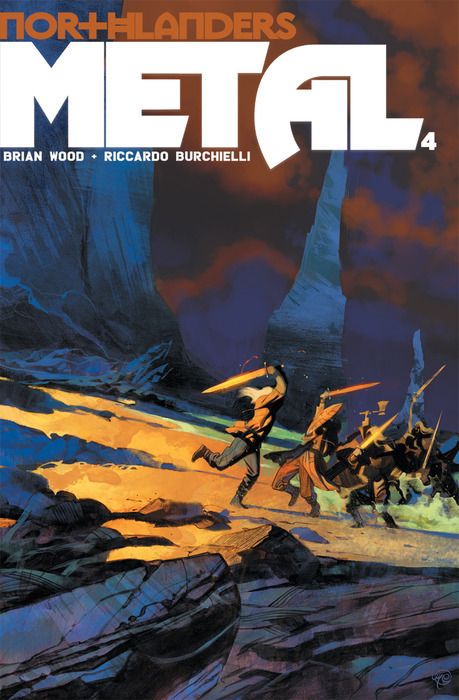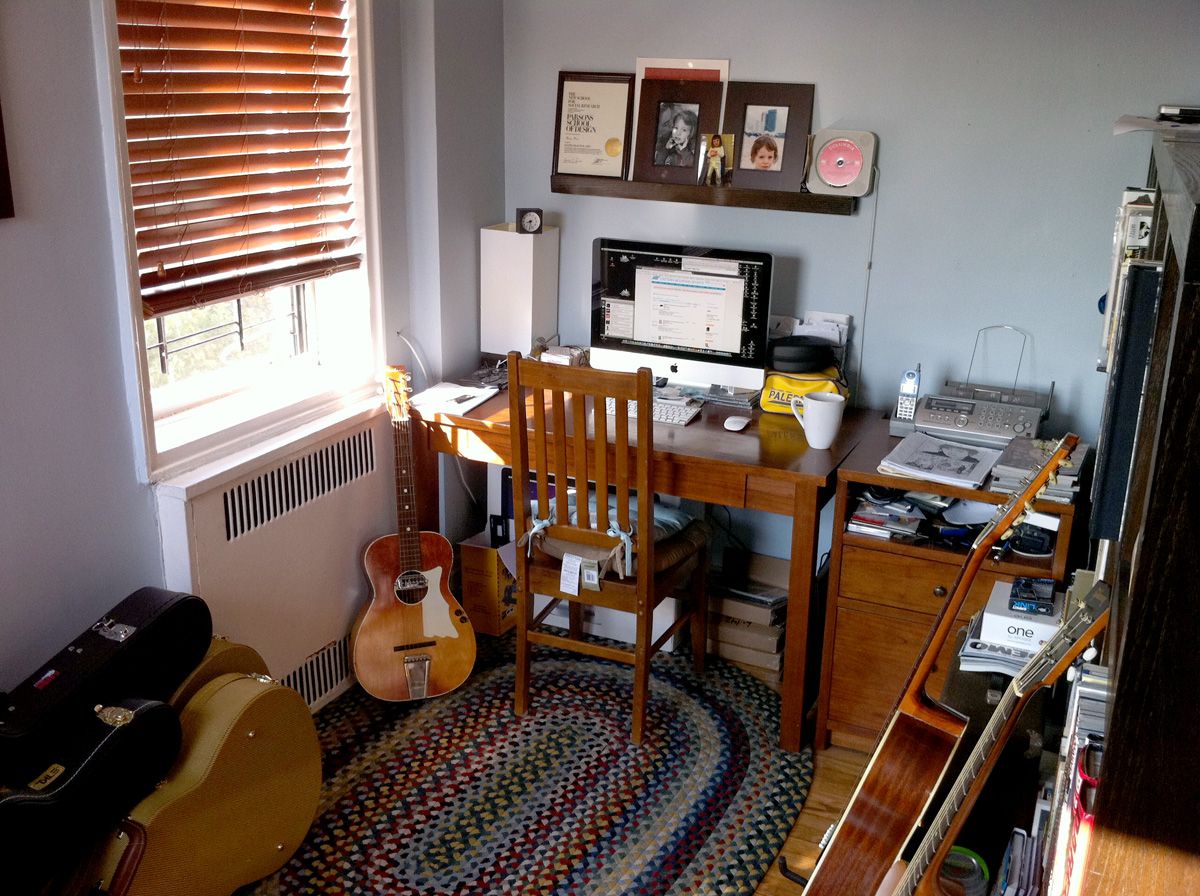Since I began interviewing comics creators back in 2005, I've talked to Brian Wood more than two dozen times. When we first spoke, Channel Zero had just been collected by AiT-PlanetLar and he was working on his second creator-owned project, The Couriers. Since then he grew into one of the biggest names in independent comics before graduating to the offices of DC's Vertigo imprint, where he's entered the mainstream with works like DMZ, Northlanders and his return to Demo. He recently completed writing his first work on company-owned characters in almost a decade, reviving Wildstorm's Dv8 series. With DV8 and Demo v2 behind him and DMZ counting down to the final issues, Wood is redoubling his efforts on his Viking crime series Northlanders while getting ready for a new round of series -- including one chronicling musicians that sounds like my new favorite comic.
Chris Arrant: Let’s start with an easy one – what are you working on today, Brian?
Brian Wood: Oh, I guess we're starting off with me being lame and saying "its something I can't talk about," that's yet to be announced. So let's forget I said that and instead I'll lie and say that today I started the first issue of the final year of DMZ. I'll probably actually start on that tomorrow. I've also been on a real tear recently with coming up with new ideas and pitches, for some reason. I have that fear that all of us have at one point or another, which is the fear of not having another good idea ever again, the fear of not being able to create something to follow a current critical success. I mentioned DMZ in its final year. I also concluded Demo recently, and I finished writing DV8 many months back. A lot of stuff ending, and requiring a bunch of new stuff to replace it. A new "era" in my career, really, especially when it comes to doing something to follow DMZ. Anyway, after worrying too much I've enjoyed a real run of creativity, and have seven or eight mostly completed pitches just sitting here. Enough to last me a while.
Arrant: I’ve seen you on a real musician kick as of late – I noticed on Twitter you actively picked up guitar-playing, and I’ve read musings of you doing something based on a popular band somehow. And the music issue of Local was probably my stand-out. I’m not going to ask you to spill the bills on any kind of music-comic (unless you want to), but what are your feelings about music and the occupation/hobby/exercise of being a musician?
Wood: I picked up the mandolin a couple years back, mostly because I grew up with folk music and I was looking for something creative to do that in no way had anything to do with my job (which is creative, yes, but it's creative on deadline for a paycheck -- I wanted something purely for me). After a year I got a guitar and it was absolutely connected to a series pitch I was writing that had something to do with the Beatles. I learned to play, quite literally, because I wasn't sure I could write a book about musicians and fake the songwriting stuff. Now I'm in it pretty deep, have a small collection of '60s guitars, and still try and keep it purely for me only. My 4-year-old daughter and I have a pretend band, though, that I want to turn into a real band and record some stuff.
Anyway, that Beatles thing has changed a bit over the course of several drafts of the proposal and it's not so much about that. It's still about music. What I would really love to do, if there existed a publisher willing to pay me to do it, is to create a Northlanders-esque series but about music. Take "Vikings," replace that with "music" and that's it. This is really where my head and heart is these days.
Arrant: In my mind, you’re neck and neck with Warren Ellis when it comes to a creator thinking about format for storytelling. Demo was an exercise in that, and you’ve done similar things in DMZ and Northlanders with some epic story arcs followed by some very concise and gripping one-shot issues; like a Led Zeppelin song followed by a quick three-minute burst of punk or something like Northlanders #17 or the recent #29, or the great DMZ #50. Does format follow storytelling, or does storytelling influence the format?
Wood: Storytelling influences the format in most cases. Demo was an instance where the story and format were invented at the same time. Local was another where I knew I wanted to use that Demo format again and so created a story to fit it. But in most cases since then, the story is always first. I have a catalog of story notes for Northlanders, and when it comes time for my editor and I to plan out the next year on the book, I can see that, okay, maybe a one-shot should happen next and then a longer arc for the next collection, etc., and I have the stories available already to put into sequence.
Warren is much smarter and forward thinking than I am when it comes to format, and for the last five years I've been at DC, where experiments in format are not really appropriate. I do what I can, but I've really been happy to focus my energies on the writing itself and save more experimenting with format for some later date.
Arrant: I remember a few years ago you talking about a book called Dog’s Day End and also something (I think) called The Hoteliers. What’s the status on those – did they turn into something else, fall by the wayside, or what?
Wood: "The Hoteliers" was the name of the fictional band in The New York Four, nothing more. I registered the domain name and had some plans to create a fake website to support that, but I never found the time. Dogs Day End is a heartbreaker, and a long story. It started off as a story idea for the original Demo that I felt could stand on its own, so later on I pitched it as an OGN to Top Shelf. A bunch of shit went wrong, ranging from schedule problems to my own writing problems, and after a few years I shelved it for a bit, reworked the story, found a new artist, and tried again. And it was at that point I realized that really the only problem was with me, and my inability to write that goddamn story. I think time's just passed it by, to be honest. I love the idea of it, but I just cannot make it work.
A few months back I radically, and I mean truly radically, overhauled it in an attempt to make it current and fresh, and it has a real distinct music theme to it now, in keeping with where I'm at. It also has a new name. But a very smart editor I know suggested to me that perhaps its not a comic but a novel, a prose work, which I found interesting enough to give that further thought.
I say this is a heartbreaker for several reasons: I've never failed like this ever before, and two artists and a publisher put their time and money and faith into the belief that I could pull it off, and I couldn't. And like I said, there is a great story in it, somewhere. I hate to continue to shelve it, but there is nothing else to be done right now.
Arrant: I’ve noticed you’ve pulled back a bit from design on your work – JP Leon took up drawing the covers on DMZ, and I haven’t seen any design work for you besides layout and logo treatments. Is this just a reaction to your want and the pull of more writing work?
Wood: Yeah, I still do all the logos and cover layouts, including DV8. I also do the covers for the DMZ collections. It's just become less important to me these days, and if I have the free time I end up preferring to spend it writing. Maybe that'll change in the future, but right now it's just where I'm at. Maybe I'll do some art for the DMZ singles before the series wraps up.
Arrant: You’re over halfway done with your rare work-for-hire book DV8 over at Wildstorm. With DC actively looking for some new blood on their characters, have you been tugged to go that way – or do you have some particular projects you want to do, like you did DV8?
Wood: It's funny, I wrapped up DV8 this past May. I have some pitches into Wildstorm, and plan on seeing what there might be for me in the DCU. But as you know, Chris, I've spent a lot of time and blood and sweat and tears creating a creator-owned career without doing company-owned work to support it. This is a very rare thing, and I don't mind saying I'm proud of it. It has its ups and downs, and I also don't mind admitting every time I see some rookie writer get an A-list book at Marvel or DC after just a single well-received original book I don't wonder if I'm missing out on something. But I tend to believe that I'm happier as things are now than if I chased after that work.
That said, DV8 broke the ice a little, and I'm sure it won't be the last company-owned work I do. But that work will always, always be in the minority to my creator-owned stuff.
Arrant: Recently you posted on your blog about revisiting your older works like Channel Zero to update their ideas for film treatments. What’s that like for you, to be able to come back to earlier works with your modern frame of reference?
Wood: My agent is always after me, and rightly so, to adapt and write the screenplays for my own books. I prefer to pick and choose ... I'd absolutely love to be a writer on a Local TV series or a Northlanders film, for example, but am more than happy to leave that to others on books like Supermarket or The Couriers. And I always put Channel Zero into that latter category only because to me that book is old. Like, really fucking old. I would find it impossible to get back into the mindstate I was in when I created that back in 1996 as a college student. It's a lost cause.
But a couple months ago I gave in and told my agent I'd write a treatment following her question: "How would you change it in order to reconnect with it again?" And the answer is, I found out, to completely and totally overhaul it. Start over from scratch. And I did and it was really refreshing and now I have a pitch that works as either a really aggressively forward-thinking Channel Zero adaptation or a brand-new property. The themes of the '90s book feel quaint by today's standards, and so it was a fun challenge to think about what would a Jennie 2.5 care about today?
The print publication rights for Channel Zero remain available, and this new idea could even be a new comic book miniseries if I felt the time was right to bring that title back.
Arrant: You’ve been amazingly steadfast with a group of comic artists, working with them repeatedly – like Rob G., Becky Cloonan, Ryan Kelly and Riccardo Burchielli. I know it might be tough to carve out friendships when most comics is conducted over email, but do you have a sense of camaraderie with these folks or others? Does it help with the remote nature of the business?
Wood: I consider all of those people you mention to be friends of mine. I think when work is actually being conducted, when work emails are being swapped, its pretty professional, and I think that's my temperament as well as the way things should be in order to have a smooth and clean working relationship. But that doesn't apply at cons or signings or openings or anything like that. Going through the rigors of a project like Demo or Local or, christ, one the length of DMZ, it binds you to the other person in a very unique way.
Arrant: Where do you see yourself in 10 years?
Wood: Number one before all else, work-wise: still making books. One thing I've promised myself, and my readers, is I will never be that guy that uses comics as a step towards fulfilling what its my secret (or not so) goal of being a TV writer or screenwriter. Not that I will restrict myself to comics and only comics, but I hope it always remains my first priority.



